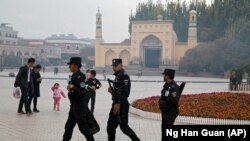This year, the Islamic holiday of Eid al-Adha fell on July 31. On Twitter, Chinese Foreign Ministry spokesman Lijian Zhao tweeted a message of congratulations to Muslims celebrating the holiday around the world.
“Eid Mubarak (traditional Eid greeting) to all celebrating Eid-Al-Adha today. It’s the second Eid under the pandemic. Stay safe & keep well.”
The message is misleading.
The Chinese government has long had a policy of persecuting Muslim minorities in China, particularly ethnic Uighurs in the western province of Xinjiang. Officially the reason is to combat “religious extremism.”
But human rights groups and Uighur victims of the crackdown and relatives report what amounts to state persecution of almost any outward sign of Islamic religious faith. That includes celebrating holidays such as Eid or fasting during the holy month of Ramadan.
For example, a Human Rights Watch report on the situation from April 2005 noted:
“Celebrating religious holidays, studying religious texts, or showing one's religion through personal appearance are strictly forbidden at state schools.”
It continued:
“Violations of these strictures can result in expulsion, fines, entries into the personal file that the state keeps on every Chinese citizen, harassment of one's family, and administrative punishments, including short-term detention and administrative detention in China's notorious and discredited reeducation through labor (RTL) program.”
In more recent years, there has been a marked increase in pressure against Uighurs, with the Xinjiang Uighur Autonomous Region (XUAR) being described by some witnesses as a “police state” whose residents are subject to constant surveillance.
The more recent stories from escapees and others align with the Human Rights Watch report. Individuals are targeted for ordinary religious practices such as studying the Quran and other Islamic holy texts, wearing traditional Islamic dress, celebrating holidays, and observing religious practices such as abstaining from pork and alcohol.
As one Twitter user pointed out, the picture of a cartoon Muslim family in Zhao’s tweet shows female members of the family wearing traditional Muslim headscarves (hijab), which since 2017 has been banned in Xinjiang, along with long beards for men.
Since 2016, the Chinese government has been detaining Uighurs in Xinjiang en masse and housing them in “educational” or “job training” centers. Many had fallen under suspicion for adhering to Islamic religious practices such as observing dietary restrictions, abstaining from alcohol and tobacco, or studying Arabic to read the Quran.
A 2019 report from the United Nations Office of the High Commissioner for Human Rights (OHCHR) noted that an estimated 1 million to 1.5 million Uighurs and other ethnic minorities have been detained since 2016. It also noted that the whereabouts of nearly 500,000 Uighurs were unknown at the time.
On July 9, the U.S. Treasury Department sanctioned the Xinjiang Public Security Bureau and four former or current Chinese officials in Xinjiang under the Global Magnitsky Act, a U.S. law aimed at punishing human rights abuses and corruption.
The department cited allegations of “mass arbitrary detention and severe physical abuse, among other serious abuses targeting Uyghurs, a Turkic Muslim population indigenous to Xinjiang, and other ethnic minorities in the region.”
On July 31, the department added two more individuals to the sanctions list.
“The Chinese Communist Party’s human rights abuses in Xinjiang, China against Uyghurs and other Muslim minorities rank as the stain of the century,” it said in a statement.
The sanctions freeze any U.S.-based assets of those on the list and bar entry to the United States.





